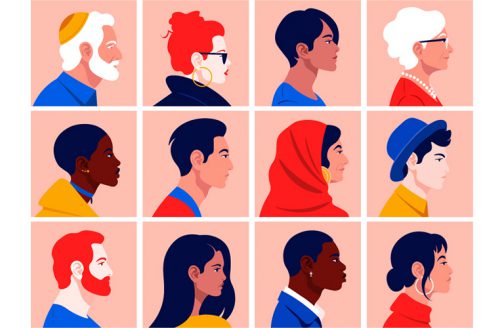Discriminating minds: Three perspectives on racism, part I
 SHUTTERSTOCK
SHUTTERSTOCK After watching thousands of young Germans take to the streets in solidarity with US protestors demonstrating against the violent death of George Floyd, it looked as if some people in Germany were coming to understand – for the first time – that racism might also be a problem “over here.” For decades, racial discrimination was seen as something that plagued the United States, not Germany. Post-war West German society thought its significant efforts to actively address its Nazi past rendered itself immune to racism. In a similar vein, many communist East Germans saw the concept of anti-racism as a constitutive raison d’état. Even after reunification, a majority of Germans were at most willing to admit to the existence of “xenophobia,” but not to racism as such.
Mainstream opinion in Germany saw racism as a concept expressed by right-wing extremists, if at all. It was not considered an appropriate term to describe the negative daily experiences suffered by individuals of non-German backgrounds. Reports of these kinds forms of discrimination – which included such things as ongoing inequity when applying for a job, difficulties trying to rent an apartment and “ethnic profiling” during police checks – were often met with a shrug of the shoulders.
In today’s Germany, however, the focus of attention is on the role played by the police, much like in the US after the death of George Floyd. And it’s not the first time. Most recently, there has been an ongoing scandal surrounding the shoddy police investigation into a series of murders carried out by the extreme right-wing terror cell known as the National Socialist Underground or NSU. For years, the police steered its detective work in the wrong direction, thereby rendering the actual victims of the terror – eight people of Turkish descent and one of Greek origin – as perpetrators. The police seemed to think at the time that any murder taking place in the context of Germany’s “foreign communities” was most likely linked to drug trafficking, debt-collection violence or some other form of organized crime.
When it was revealed that a far-right extremist group was responsible for the terror, subsequent investigative reports came to the sobering conclusion that the police force itself was plagued by routine misperceptions and subsequent action that assumed a self-evident link between criminal behavior and “individuals with a migration background.”
But what were the implications of these revelations? It became clear that it wasn’t a question of individual members of the police force having extremist positions or engaging in misconduct; it was the routines and practices of the police force itself that were having a discriminatory effect.
A similar investigation into race-related police failures was carried out in 1993 after the murder of Stephen Lawrence, a black teenager, in the United Kingdom. Six years later, in 1999, a commission headed by former High Court judge William MacPherson concluded its examination of the handling of the murder with a clear verdict: The problem plaguing the British police force was one of “institutional racism.” This public inquiry was a milestone, as it showed that the issue was not racist behavior in the form of individual misconduct or isolated exceptions to the rule; the commission found that racism was deeply engrained in the institutional structure of the police force.
Most representative surveys undertaken since the 1990s indicate that a majority of Germans have “prejudices.” The issue here, too, is not one of individual error; it is something that can be referred to as “racist knowledge,” that is, a form of societal knowledge generally widespread and often reinforced across politics and the media. Whether consciously or unconsciously, this racist knowledge legitimizes the differences and inequalities between “us” and “them” – even though democratic principles forbid discrimination of this kind. Article 3 of Germany’s Basic Law states that “No person shall be favored or disfavored because of sex, parentage, race, language, homeland and origin, faith or religious or political opinions.” In reality, however, German society is characterized by a job-market “underclass,” by discrimination in the realms of education and health and by the unequal treatment of and significantly higher risks of poverty for individuals with foreign backgrounds.
The Martinique-born psychiatrist and political philosopher Frantz Fanon once wrote that a society was either racist or not; racism, he argued, was not accidental. Indeed, racism has played a significant role in the history of modernity. The initial contact made by Europeans overseas laid the very foundation for an anti-dialogical principle: When Columbus first set foot on land in the Caribbean, he did not seek dialogue with local inhabitants – he chose instead to read out a statement in Spanish declaring ownership of the land.
In this case, the “others” were simultaneously included and excluded. Without having been asked, they had suddenly come under the domain of the Spanish crown. They were not even considered full subjects; they were merely individuals who now had to be educated in the “correct” religion and forced to engage in a “right-minded” form of labor. If they chose not to accept their new status, they would be designated as “barbarians” and face terrible consequences.
Even back then, this kind of violence did not go unchallenged, and there were fierce discussions on the legality of slavery in the 16th century. Unfortunately, when slavery was widely abolished in the 19th century, colonialism simply replaced it as the “better” and supposedly more humane alternative. Subsequently, during the process of decolonization, migration to rich Western countries began, thereby ushering in a new round of exclusion by inclusion. To this day, individuals in Germany who were recruited to work in factories in the 20th century are referred to as Gastarbeiter, or guest workers.
The problem is always seen as being “the others.” People often consider “them” to be lazy, aggressive, loud, not yet mature and unwilling or even unable to integrate. In 2018, in the aftermath of anti-immigration riots in the town of Chemnitz, Germany’s minister of the interior stated matter-of-factly that migration was “the mother of all problems.”
Today, we in the West generally live in societies where racist divisions between “us” and “them” are no longer rooted in direct violence. Yet our markets, legal systems, cultural achievements and knowledge are still shaped to a certain degree by racism.
One encouraging aspect of the West is that it also created a tool with which to combat its own racist past and present, namely democracy. In heterogeneous democratic societies, different memories must be taken into account, different starting points must be considered and discrimination must be prevented. Democracy is not a zero-sum game, and the actions we are seeing today – the anti-racism protests, the toppling of racist monuments and the debates surrounding the renaming of buildings – can only help deepen democratic rights and give a fresh new meaning to the term “us.”
Mark Terkessidis
is an author and researcher focusing on race and migration. Based in Cologne and Berlin, his most recent work is Wessen Erinnerung zählt? Koloniale Vergangenheit und Rassismus heute (Whose memory counts? Colonial past and racism today), Hoffmann und Campe, 2019



